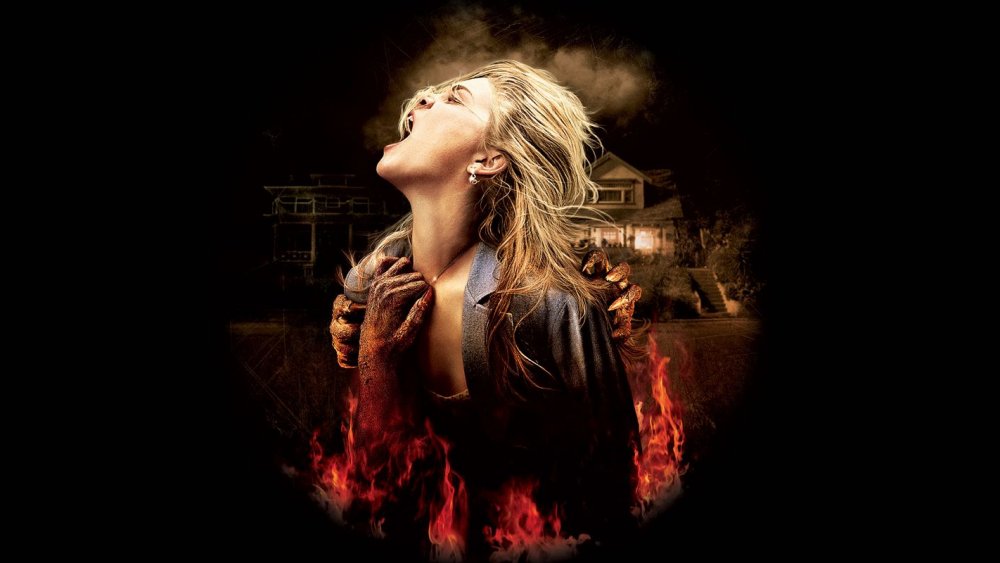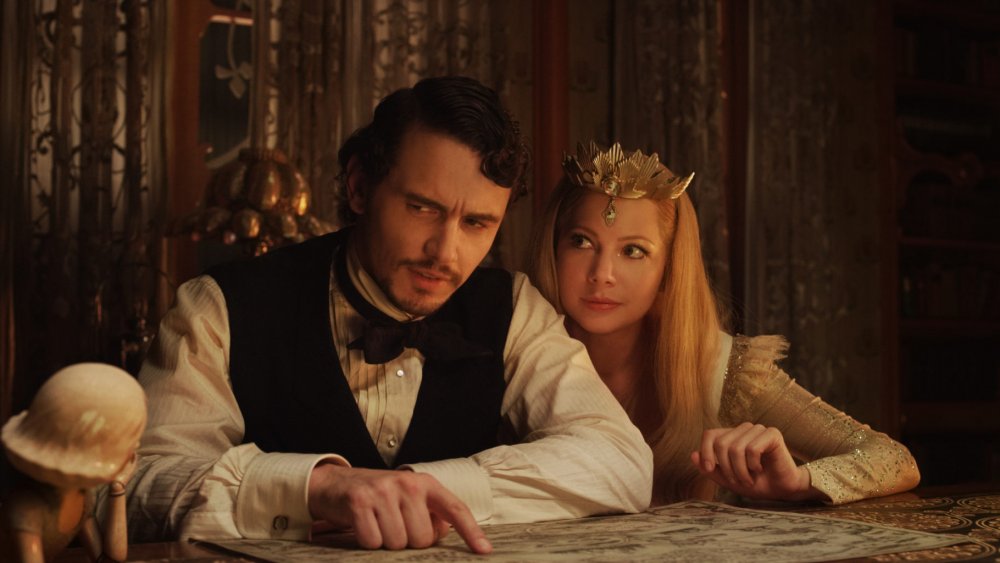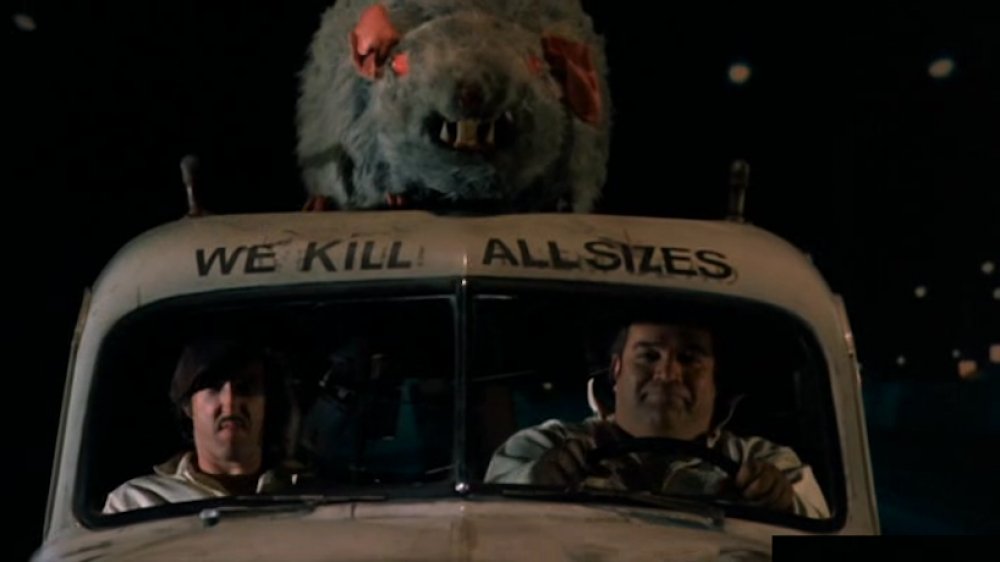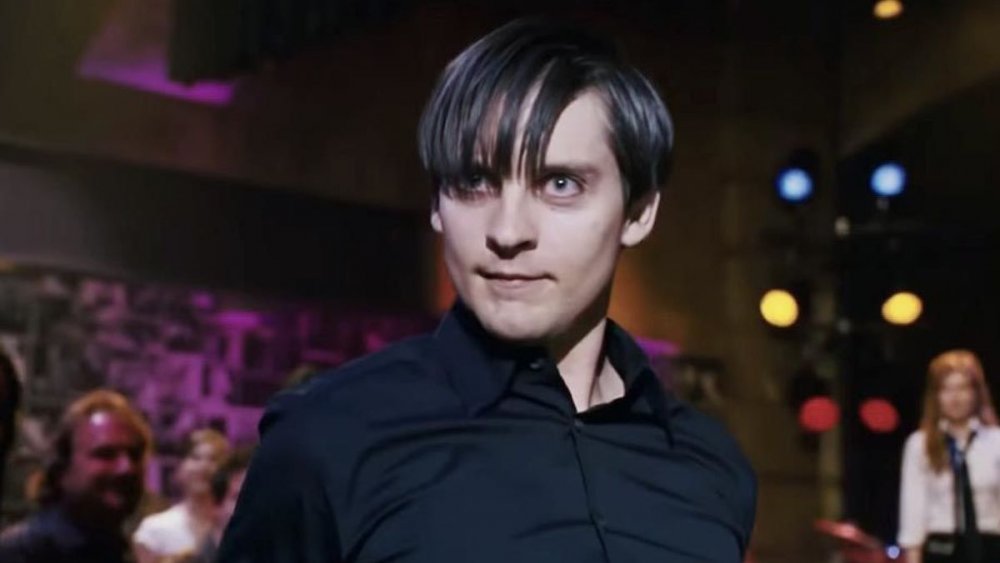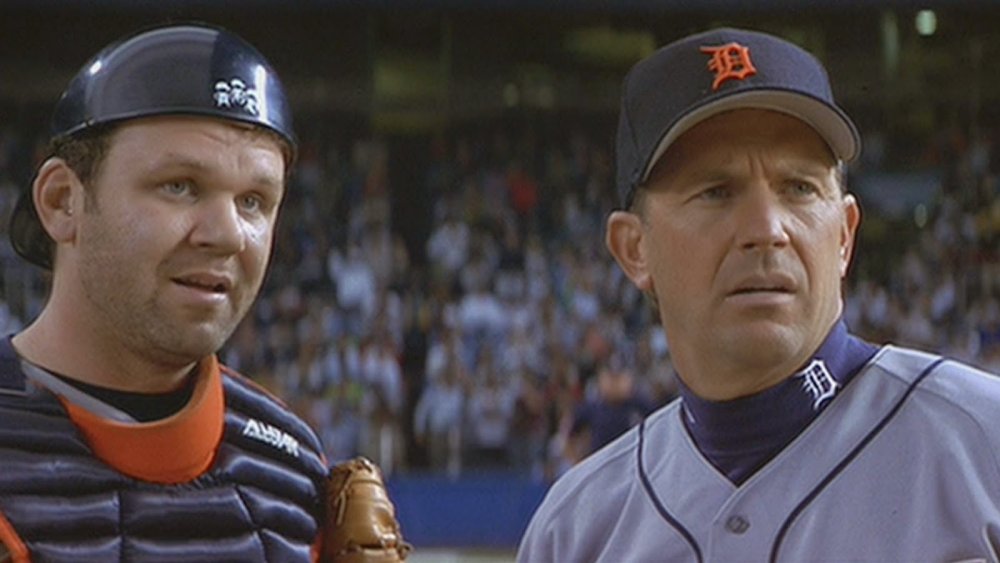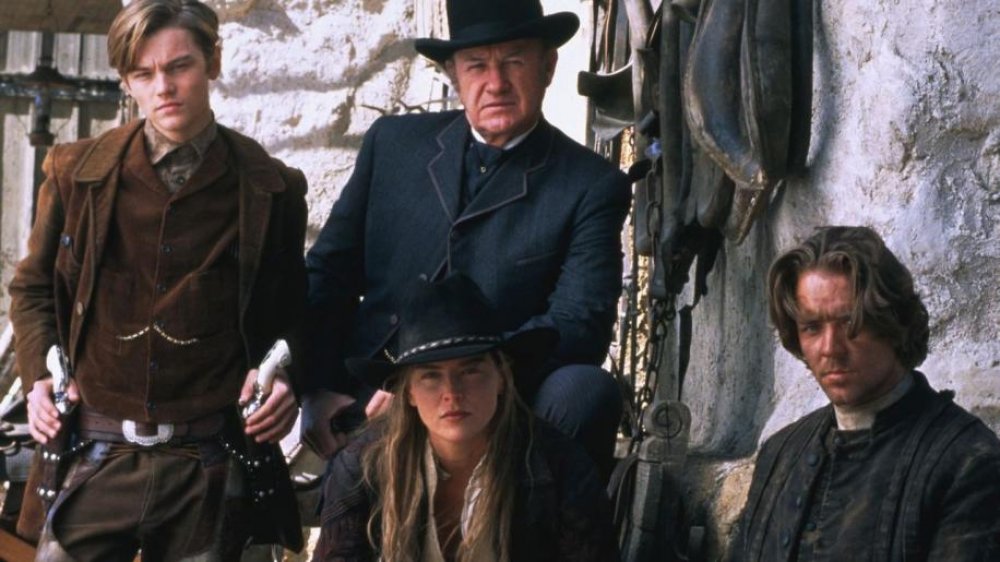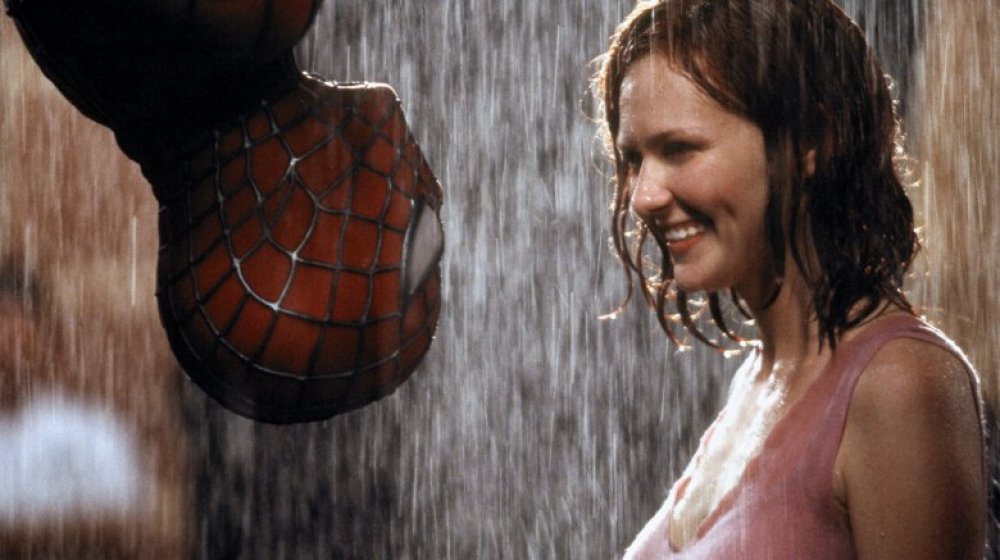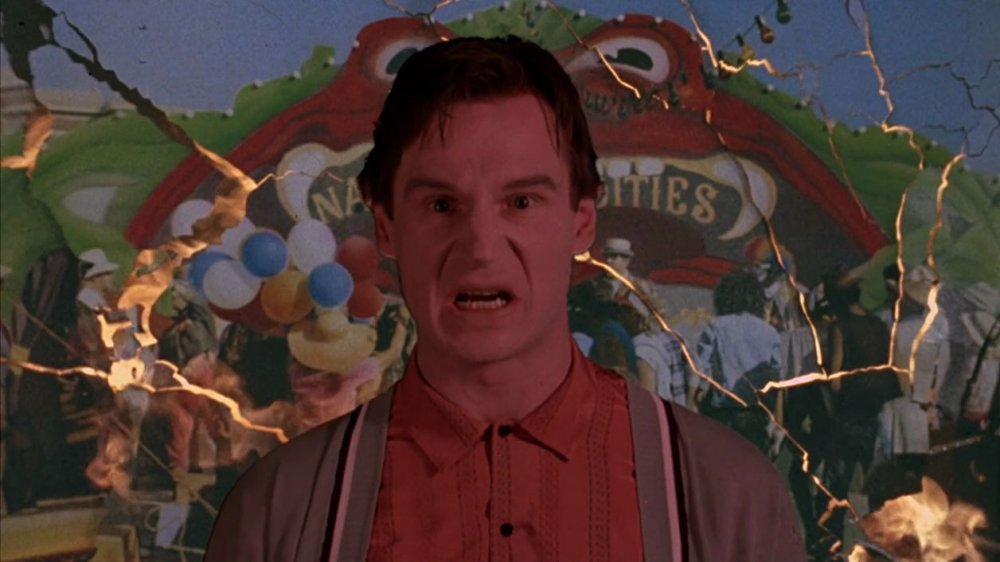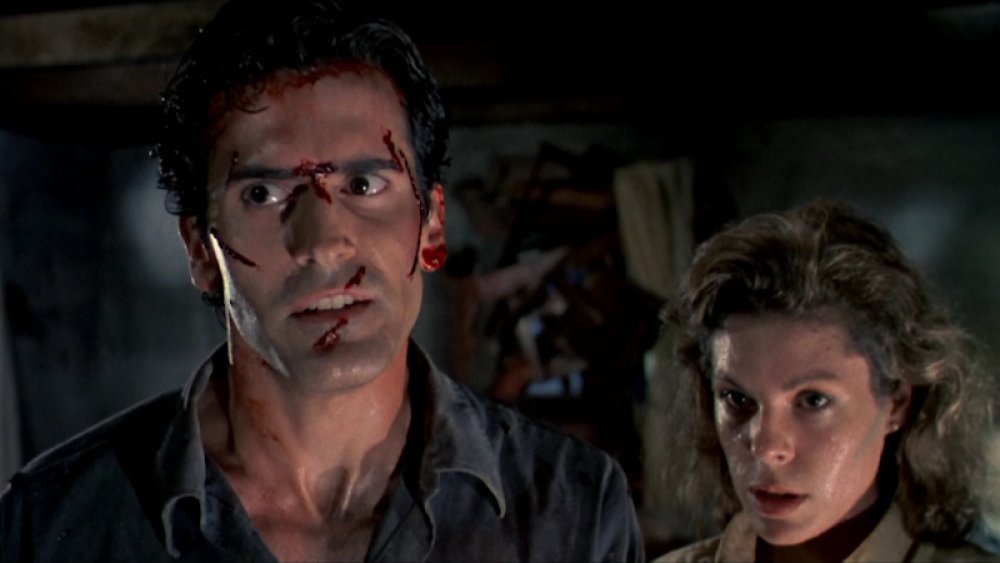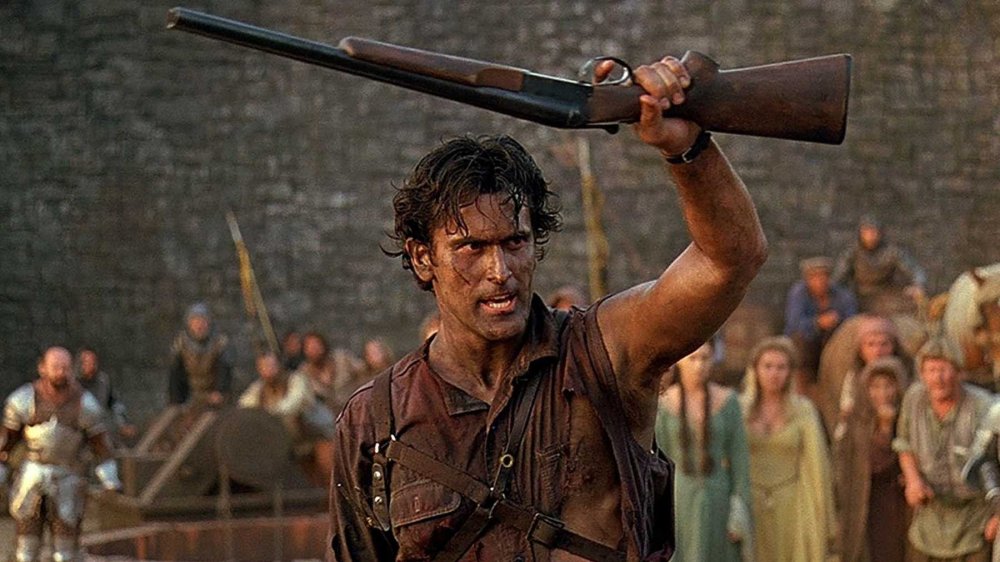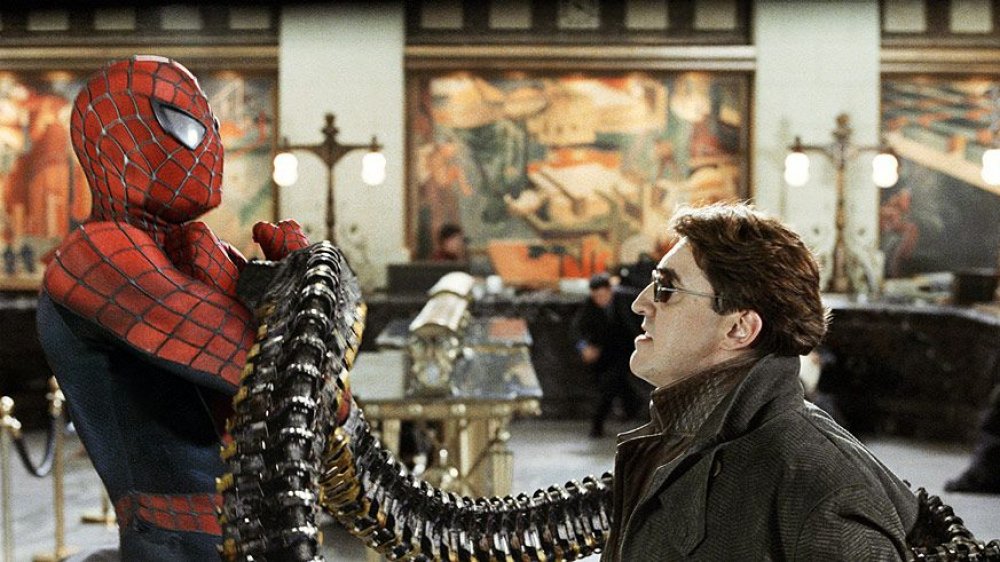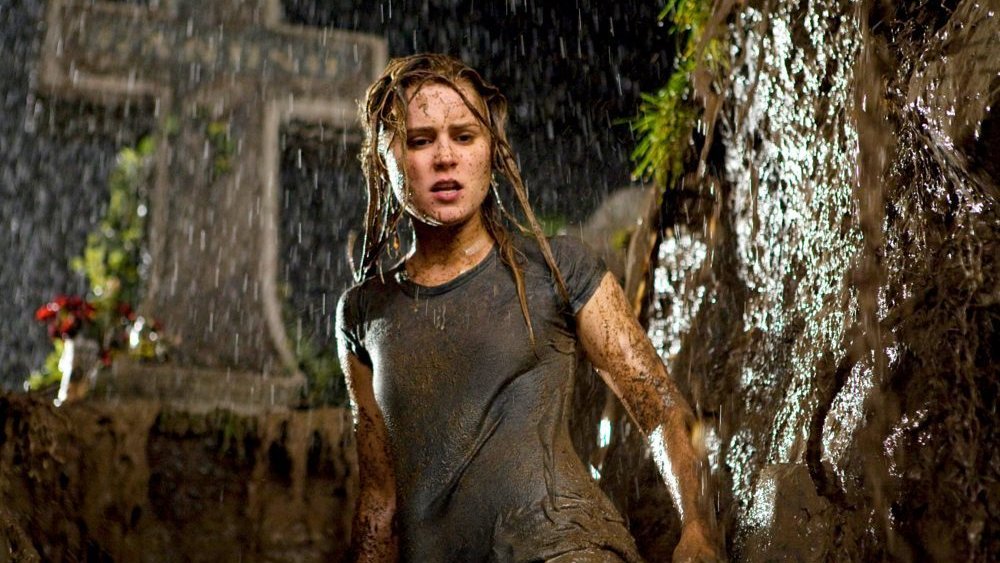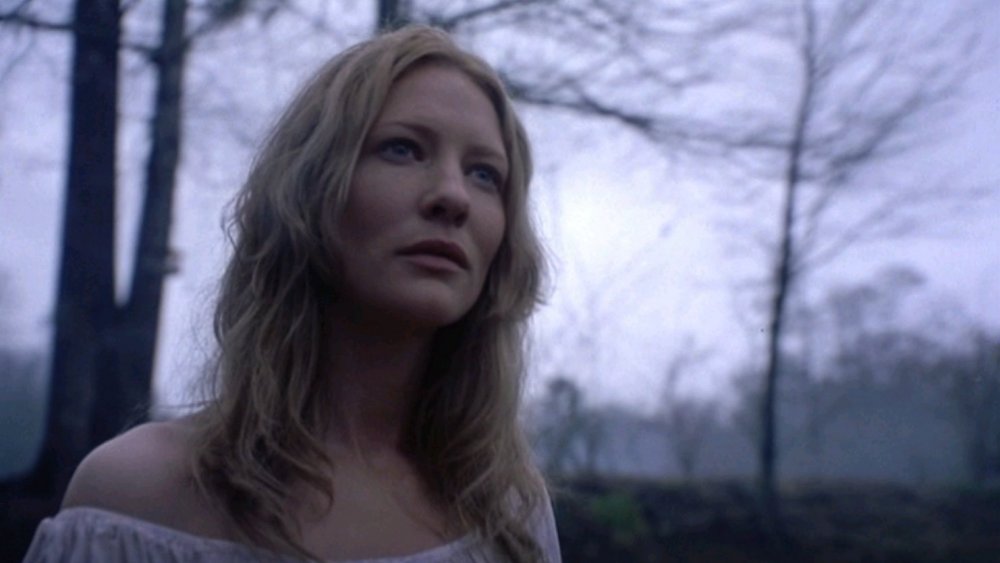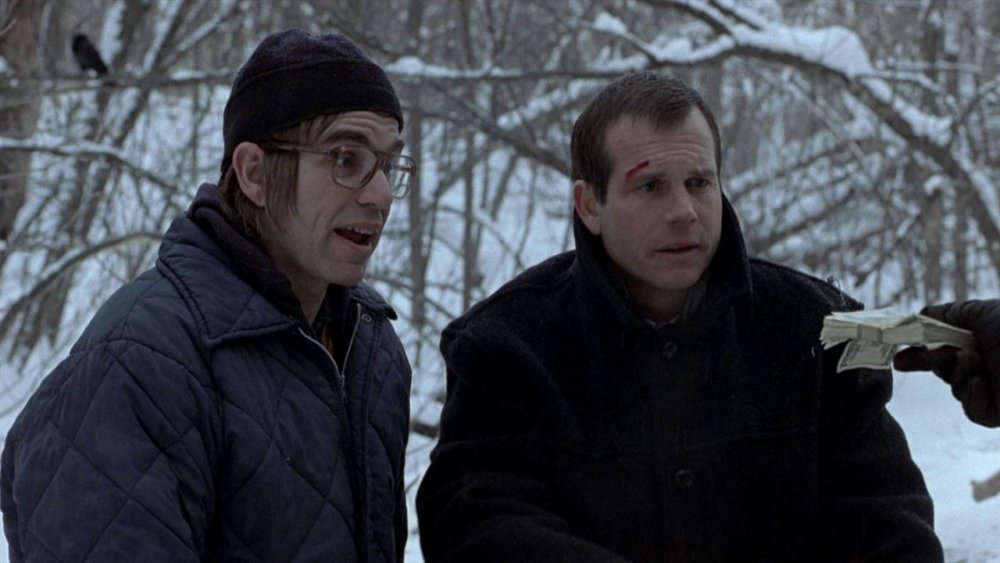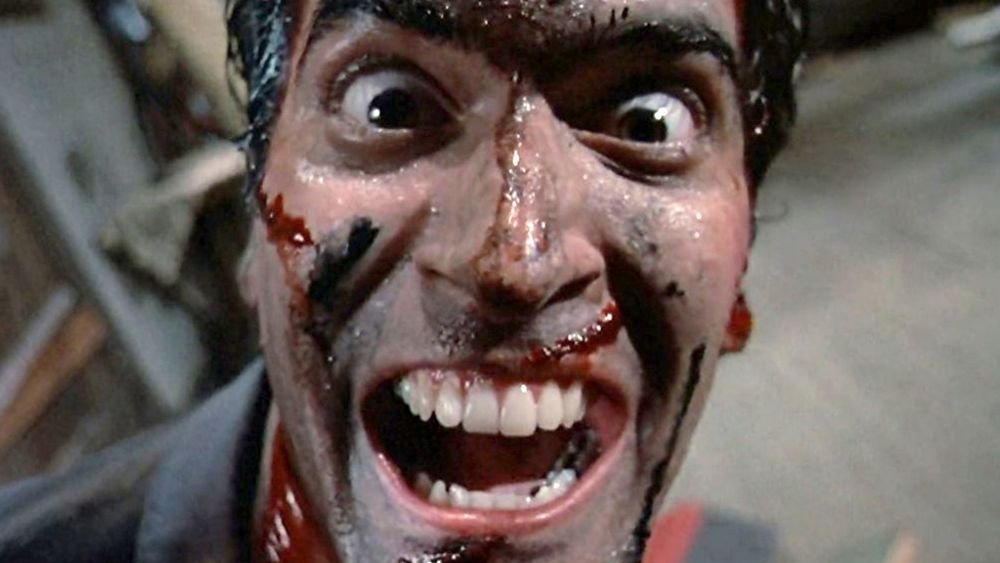Every Sam Raimi Movie Ranked Worst To Best
He's been working in movies in one form or another for nearly five decades. And while he's delivered a handful of bona fide blockbusters over the years, he's still seen by many in and around Hollywood as an outsider. Still, for a certain set of genre-hungry cineastes, the name Sam Raimi carries as much reverence as Scorsese, Fellini, or Spielberg.
Truth be told, horror fans the world over would likely be quick to claim Sam Raimi as the Scorsese of splatter. One look at the films listed in Raimi's blood-soaked oeuvre would be enough to confirm as much. But those who've born witness to the mirth, mayhem, and malevolent moxie on display in those films know the truth about Sam Raimi.
And the truth is that Sam Raimi is a passionate, wildly inventive filmmaker possessed of a singular artistic vision — which frequently involves gross misuse of power tools, giddy dalliances in blood and gore, and just enough camp to keep things airy. Simply put, nobody does genre fiction quite like Sam Raimi. Here's our official ranking of every one of his movies from worst to best.
Oz the Great and Powerful is an underwhelming fantasy
Plenty of folks questioned the logic of Disney producing a would-be sequel to their animated masterpiece Alice In Wonderland in 2010. Even more confusing was the studio's odd decision to not even give the new film a fresh title. Still, fears were softened when they hired Tim Burton to bring the film to life. While the critical response to Burton's Alice In Wonderland was mixed at best, the film still broke the $1 billion barrier in worldwide box office receipts.
It was hardly a surprise when Disney tried to press their luck on the "unexpected followup to an iconic movie" front. The studio's second venture in this realm came via a prequel to the fantasy epic The Wizard of Oz. Like Alice, Disney went the unconventional route in filling the director's chair, bringing Sam Raimi on board to guide Oz the Great and Powerful to the screen.
Unlike Burton, Raimi struggled mightily in folding his outside-the-box style into the stiffer Disney mold. Ultimately, he delivered a film which — aside from dazzling visuals and devilish flights of fancy — was utterly lifeless from opening shot to last. Unfortunately, those shots are 130 minutes apart, and every moment in between found Raimi wasting a $215 million budget, the talents of prime time players like Michelle Williams, Rachel Weisz, Mila Kunis, and James Franco, and the time of most viewers who bought a ticket to Oz the Great and Powerful.
Crimewave might be Sam Raimi's most overlooked movie for a reason
After gaining raves for his no-budget feature debut Evil Dead in 1981, Sam Raimi found himself pairing up with major Hollywood studio Columbia Pictures for his followup. He also found himself working with a multi-million dollar budget, and crafting a screenplay with a couple of showbiz up-and-comers by the names of Joel and Ethan Coen. Yes, that Joel and Ethan Coen — the Coen brothers, the same duo whose masterful 1984 debut Blood Simple was about to make them the toast of the indie film world.
With all that burgeoning talent on board behind the scenes, one might be properly baffled by the resulting film, 1985's Crimewave. The fact is that Raimi's first foray into studio filmmaking did not go particularly well, with the director essentially disowning Crimewave altogether while it was still in post-production. If you've seen the theatrical version of Crimewave, it's not hard to understand why.
Yes, Crimewave is a bit of a mess. But if you're among those who caught Crimewave on late-night TV, or via your local video store in the '80s or '90s, you know that it's a mess in marvelously manic ways, teasing classic Raimi lunacy, and a few vintage Coen brothers flourishes throughout. Though Raimi disowned the project, Crimewave has become a camp classic with a devoted cult following over the years — even if it remains one of Raimi's least cohesive films.
Spider-Man 3 proved that bigger is not always better
In the wake of Sam Raimi's Crimewave debacle, the director wisely went back to his splatterrific roots, and delivered a gore-tastic masterpiece in the process. Feeling more himself, Sam Raimi essentially spent the next decade-plus learning to work within the Hollywood machine by making a string of low-to-mid-budget successes where he could indulge his off-kilter style.
Raimi's patience was rewarded in the year 2000, when Sony Pictures hired him to direct their big-budget adaptation of Marvel Comics' Spider-Man. Raimi responded by knocking Spider-Man out of the park, and topped even himself with its near flawless 2004 sequel Spider-Man 2. Looking to cement his superhero legacy by successfully capping off a Spider-Man trilogy in 2007, there was little reason to think Raimi's Spider-Man 3 would do anything but that.
Heading into production, Spider-Man 3 had the look of a film hell bent on delivering bigger and better action than the two prior efforts combined. When the film finally hit theaters, it proved an overstuffed, overcooked, and wholly underwhelming mess that remains a painful reminder that bigger is not always better. Though opinions on Spider-Man 3 have softened in the years since its release, Sam Raimi clearly still has some strong personal feelings about the project, and we can't help but fall in line — if only because of emo Peter Parker.
For Love of the Game looked for love in all the wrong places
After making a name for himself as a genre guru in the '80s, Sam Raimi stayed the course for most of the 1990s. But as the decade came to an end, he tackled a pair of projects that were more than a little bit outside of his blood-and-guts comfort zone. While 1998's A Simple Plan found Raimi in top form, his next project left more to be desired.
That's not to say that the Kevin Costner-led baseball drama For Love of the Game isn't without merit. Quite the opposite is true, with Raimi dealing surprisingly well with movie's on-the-field drama — centered around an aging big league pitcher (Costner) unexpectedly enmeshed in throwing a perfect game. No, Raimi's issues in the film are decidedly of the off-field sort — which involves said pitcher reliving a failed romance in game via flashback.
Yes, that narrative approach is as corny and cliche as it sounds. It also never lets you settle into the action, on the field or off. More problematic is that Raimi had serious trouble working the romantic side of the story — though he wasn't helped by an undeniable lack of chemistry between Costner and co-star Kelly Preston. Raimi found his romantic groove with Peter Parker and Mary Jane Watson years later, but For Love of the Game lacks the necessary emotional resonance. As such, the film plays like half of a decent sports drama and half of a really bad soap opera.
The Quick and the Dead is a cult classic worthy of such obsession
One of Sam Raimi's more surprising genre departures came in 1995 when he stepped into the western realm in the gore-rific gun-slinging opus The Quick and the Dead. Set in the fictional town of Redemption circa 1881, The Quick and the Dead follows a female gun hand called the Lady (Sharon Stone), who finds herself entrenched in a life or death quick-draw competition organized by a ruthless outlaw (the great Gene Hackman). What Raimi weaves from that not-quite-classic Western motif is, more or less, the feminist spaghetti western the world never knew it needed.
Just to be clear, emphasis should be put on the word "spaghetti" when talking about Raimi's unabashedly wild western confection. And that designation should tell you that The Quick and the Dead is nothing if not a classic Raimi cocktail packed with winking one-liners, random (and not so random) acts of violence, and enough giggling gore to make Quentin Tarantino jealous. It also features stellar work form a baby-faced Leonardo DiCaprio and a then mostly unknown Russell Crowe.
Unfortunately, The Quick and the Dead goes a more than a little bit overboard in the final act and doesn't quite stick the landing. But what the film may like in coherent quality, it more than makes up for in style and spirit. Of all the films on Sam Raimi's delightfully left-of-center resume, this is the one that deserves to be rediscovered by the cinematic world — if only via midnight screenings.
Spider-Man made superhero cinema legit long before the MCU did
In spite of what a certain legendary auteurs say, superhero movies are as legit a part of cinematic culture as they are pop culture. That was not the case in the early 2000s, however, when even a big-screen adaptation of one of comics culture's most recognizable figures was not a guarantee for box-office success.
Still, Sony Pictures charged into the new millennium with their high-profile production of Marvel's Spider-Man with an audacious sense of bravura — which became even more defined when they hired Sam Raimi to helm the project. Spider-Man was, after all, the biggest film Raimi had ever been a part of, and with Sony having so much riding on its success, hiring a relatively untested genre filmmaker to helm the project was sort of the Hollywood gamble to end them all.
Luckily, Sam Raimi was up to the task, and delivered a propulsive, wildly entertaining slice of superhero cinema keenly in tune with both the scope of Marvel Comics and Raimi's own outsider aesthetic. Anchored by a cast of gifted young actors (including Tobey Maguire, Kirsten Dunst, and James Franco), Raimi grounded his Spider-Man with battle-tested stars like Rosemary Harris, J.K. Simmons, Cliff Roberston, and Willem Dafoe. Add in a crackerjack screenplay from David Koepp, a few unforgettable set pieces, and an upside down kiss for the ages, and you've got the superhero film that legitimized the form and essentially laid the groundwork for the MCU a few years later.
Darkman is the superhero story the world deserved in 1990
Of course, Spider-Man was far from Sam Raimi's first foray into superhero cinema. In fact, the director had dabbled in the genre more than a decade earlier, foregoing the complexities of procuring theatrical rights to a well-known comic book property and opting instead to create his own.
Regarding 1990's gonzo superhero confection Darkman, there are few who would dare argue the project isn't a fiercely original Sam Raimi affair. To that point, Darkman — which was actually based on a short story written by Raimi, and adapted by the director with his brother Ivan — is so steeped in Raimi's gothic visual aesthetic, hyper-stylized violence, and winking camp that many would say Darkman is the most unabashedly Sam Raimi movie Raimi ever made.
And yes, it's an absolute blast from star to finish — but such an oddball affair that it's all but impossible to imagine a major studio actually backed it back in 1989. But even if the film lacks a certain studio polish, Raimi ensured you see every dime of that budget on the screen. The result is a joyously whacked out, almost anti-superhero flick that remains a fan favorite among Raimi devotees decades after release. Darkman surprisingly slayed at the box office, too, grossing nearly $50 million worldwide, kickstarting the unlikeliest of superhero franchises, and proving Liam Neeson had action star chops long before Hollywood had Taken him seriously for such fodder.
The Evil Dead is more than worthy of its iconic status
Some filmmakers take years toiling with underwhelming big screen ventures before fleshing out their cinematic style. Others arrive on the scene with a style so fully developed it seems they've been around for years. Sam Raimi is decidedly of the latter class, and his 1981 feature film debut The Evil Dead is a harrowing reminder of the fact.
It's also one of the most original, wildly homegrown no-budget horror films ever made, with Raimi getting behind the scenes contributions from The Evil Dead star Bruce Campbell, his brothers Ivan and Ted, and a handful of close friends. Produced for a reported $350,000 and shot over several months (between ongoing fundraising endeavors), The Evil Dead arrived in theaters in 1981 and, to the shock of many, became a cult sensation that screened at the Cannes Film Festival and was fully endorsed by legendary horror maestro Stephen King.
If you're among the Evil Dead enthusiasts, you know King's assertions about the film are spot on. You also know beyond doubt that it's an utter marvel that The Evil Dead was actually produced on such a minuscule budget, and watching Raimi's jaw-droppingly brutal debut is as close to a religious experience as genre purists have any right to expect. And if you're a genre fan who somehow hasn't seen it, please understand that no matter how many wild-ass, gory horror movies you've seen, you've never seen anything quite like The Evil Dead.
Army of Darkness is everything good about the Evil Dead movies dialed up to 11
Now, if you have seen Sam Raimi's The Evil Dead, you've almost certainly taken the time to track down its sequels Evil Dead II and Army of Darkness. And if that's the case, well, there's probably not much we need to tell you about just how utterly crazy 1992's Army of Darkness really is. But for the uninitiated, crazy is really the only way to classify Raimi's Army of Darkness. And please understand we mean that with the unabashed affection one might show a wayward brother or an uncle who categorically refuses to adhere to societal norms.
Make no mistake, Army of Darkness is a film that categorically refuses to be categorized. Set in the immediate aftermath of Evil Dead II, the film finds the hero of Raimi's two prior Dead flicks (Bruce Campbell's Ash) transported to the 1300s, where he proceeds (boomstick in hand) to lead a medieval village against an army of undead creatures while desperately searching for a way home. What transpires from that outrageous setup is a medieval farce beyond imagination, one that revels as much in quippy, slapstick humor as it does unflinching gore and classic horror tropes, all within the scope of a historical epic. Army of Darkness also finds Raimi taking his love of misappropriating power tools to bold new heights, and delivering the pitch-perfect franchise closer the horror world never saw coming.
Spider-Man 2 is the second best Spider-Man movie to date
Just over a decade after Army of Darkness served as the blood-tinged icing on the indie cake of the Evil Dead trilogy, Sam Raimi would find himself directing the middle film in the blockbuster Spider-Man franchise that made him famous. As it happens, the middle film of Raimi's Spider-Man saga was every bit as impressive as the shocker that preceded Army of Darkness, though for dramatically different reasons.
First and foremost, Spider-Man 2 easily bested Raimi's original Spidey flick in both scope and narrative ambition. It did so by gracefully building on Spider-Man's sturdy foundation, and further shaping a superhero movie that looked beyond super-powered heroics and found something far more human. Of course, like any sequel in a superhero franchise, Spider-Man 2 also benefits greatly from not having to deliver an origin story. Free from the shackles of origin, Raimi instead crafts a stylish, surprisingly grounded superhero tale that openly acknowledges life would probably be better for the hero if he wasn't one at all.
The tender-hearted humanity of Spider-Man 2 is anchored by series-best work from Tobey Maguire and Kirsten Dunst as the perpetually doomed lovers Peter Parker and Mary Jane Watson. But where Spider-Man 2 really excels is in its depiction of its tragic villain Doctor Otto Octavius. And what can we say of Alfred Molina's heart-wrenching turn as Doc Ock — except that he was so good another actor likely won't consider tackling the role for years to come?
Drag Me to Hell was a welcome return to form a genre master
Sam Raimi has always returned to his horror roots in the wake of big-screen breakdowns. That trend has, however, led to some of his better genre cocktails. And as far as Raimi's bloody rebound movies go, Drag Me to Hell is one for the ages.
As it happens, Raimi almost didn't direct Drag Me to Hell, first offering the director's chair to another genre genius in Edgar Wright (Shaun of the Dead, Baby Driver). In Wright's own words, Drag Me to Hell was "so obviously a Sam Raimi film" that he encouraged Raimi to direct it himself. Raimi eventually relented, got on board to guide Drag Me to Hell to the big screen, and delivered one of the best, purest horror flicks of the past couple of decades.
It's also one of the more socially conscious offerings in Sam Raimi's catalogue, with his tale of an ambitious loan officer (Alison Lohman) foreclosing on a seemingly helpless old woman (Lorna Raver) ringing true in the wake of the housing crisis. Of course, the old woman has her revenge by casting an unbreakable curse on the banker that will send her you know where. Propelled by meticulously executed jump scares, a screenplay that knows exactly when to laugh and when to shiver in fear, and an insatiable thirst for gore, Drag Me To Hell is inarguably the sort of brazen freak show Sam Raimi was born to make.
The Gift is a gothic diamond with a small town Southern twist
Speaking of Sam Raimi's rebound movies, the minor masterwork he delivered in the wake of For Love of the Game is another sinister, palate-cleansing delight. Titled simply The Gift, Raimi's Southern Gothic chiller was penned by Billy Bob Thornton and inspired by real-life tales from Thornton's mother's adventures as a clairvoyant.
Though apparently not inspired by any single event in her life, The Gift finds Annie Wilson (Cate Blanchett standing in for Thornton's mom) embroiled in a local tragedy after being consulted to help find a missing woman. She's soon tormented by horrific visions of the woman's fate, most of which prove shockingly accurate. What unfolds after that grisly discovery is a moody little pearl of a whodunnit filled with more twists and turns than a mountain pass as Annie tries to figure out which of the townspeople did the dastardly deed.
We wouldn't dream of spoiling any of those twists for those of you who haven't seen The Gift. Watching the exacting and surprisingly restrained way in which Raimi approaches each is part of the fun — even if the final twist is a bit too obvious. Still, when a filmmaker is working at the level Raimi is in The Gift, twists are hardly the point. Better to just sit back and let the film's intensely eerie overtones wash over you like a waking nightmare, and thank the dark stars above that Sam Raimi was allowed to make such a potent treat.
A Simple Plan made an auteur of a genre hero
While The Gift found Sam Raimi taking a more restrained approach to horror, it still allowed for a few distinctly Raimi-esque flourishes. The same cannot be said for the marvelously muted crime drama he delivered just two years prior. In fact, A Simple Plan mostly found Raimi working without a net in regards to tried and true genre tropes. The result is no less immersive, or distinctive, with Raimi leaning heavily on mood to bring a relentlessly ominous edge to the proceedings.
Equal parts family drama and white-knuckle crime thriller, A Simple Plan follows three small town Minnesotans (Billy Bob Thornton, Bill Paxton, and Brent Briscoe), who happen upon a crashed plane and roughly $4 million in cash. A plan is hatched to split it amongst themselves, but unforeseen obstacles, dangerous foes, and deep-rooted mistrust quickly come into play. As they do, A Simple Plan spirals tragically into the dark heart of humanity, with each new twist sucking the film's "protagonists" further into the shadows.
More in tune with Coen brothers crime tragedies like Fargo and No Country for Old Men than anything in Sam Raimi's filmography, A Simple Plan hardly feels like a Raimi movie at all. Somehow it still slots comfortably in amongst the best of his work to date, and proves beyond question what Raimi fans have suspected for years — that he's a bona-fide auteur who just happens to have a taste for blood and guts and demons and such.
Evil Dead II is Evil Dead II, so don't even try to argue this one
And then there was one. But let's be perfectly honest for a moment here and admit that when it comes to the work of Sam Raimi, the conversation usually begins and ends with his 1987 splatter classic Evil Dead II. Not surprisingly, Evil Dead II is yet another masterwork from Raimi that came on the heels of an unmitigated failure, the aforementioned Crimewave, which gave Raimi ample reason to pause before getting back behind the camera. Once he returned, Raimi wisely got back to his roots and delivered one of the greatest horror movies ever produced.
It bears acknowledging, however, that Raimi's comeback movie Evil Dead II does, in fact, bare striking resemblance to his breakout Evil Dead. Truth be told, Raimi essentially recycled the plot of that first movie and sent Bruce Campbell's Ash back into the Necronomicon-infested fray for more cabin in the woods carnage. The second time around, the scares were even more effective, the gore infinitely more grueling, and the manic energy far more menacing. Evil Dead II is also incredibly funny, with Campbell going all in on the Three Stooges-style slapstick to positively dazzling effect. But perhaps Jack Black said it best in High Fidelity, proclaiming of Evil Dead II, "It's a brilliant film! It's so funny and violent and the soundtrack kicks f***ing ass!" We couldn't agree more. And we're pretty sure you will too.
